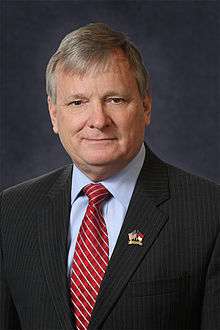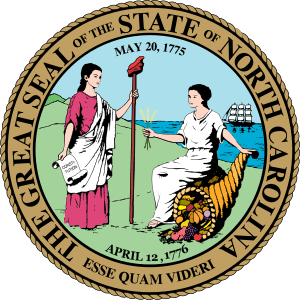North Carolina State Treasurer
The North Carolina State Treasurer is a statewide elected office in the U.S. state of North Carolina responsible for overseeing the financial operations of state government. The current state treasurer is Dale Folwell.
| State Treasurer of North Carolina | |
|---|---|
| Member of | Council of State |
| Seat | Raleigh, North Carolina |
| Term length | Four years, renewable once |
| Inaugural holder | John Ashe |
| Formation | 1715 Province of North Carolina January 1, 1784 State of North Carolina |
| Website | Official Site |
The office of state treasurer has existed since 1715 in the Province of North Carolina; at that time, the treasurer was appointed by the lower house of the legislature. In 1740, the treasurer's office was divided into two districts, and in 1779, into four. In 1784, the North Carolina General Assembly brought the treasurers under one single office, appointed jointly by both houses of the legislature.
Under the North Carolina Constitution of 1868, the treasurer became a position elected by popular vote, rather than appointed.
The North Carolina State Treasurer is an ex officio member of the North Carolina State Board of Education, the State Board of Community Colleges, the State Banking Commission, and the Council of State.
List of State Treasurers
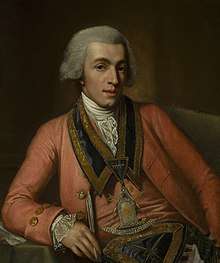
Colonial Treasurers
- Edward Moseley, 1715–1735
- William Smith, 1735
Northern District
- William Downing, 1735–1739
- William Smith, 1739–1740
- John Hodgson, 1740–1748
- Thomas Barker, 1748–1752
- John Haywood,[1] 1752–1754
- Thomas Barker, 1754–1764
- Joseph Montfort, 1764–1775
- Samuel Johnston, 1775
Southern District
- Edward Moseley, 1735–1749
- Eleazer Allen, 1749–1750
- John Starkey, 1750–1765
- Samuel Swann, 1765–1766
- John Ashe, 1766–1773
- Richard Caswell, 1773–1775
State Treasurers
Districted
From 1777 to 1779, the State was divided into two districts, Northern and Southern, each with a treasurer. From 1779 to 1782, there were six districts, each with a treasurer, as follows: Edenton, Salisbury, Hillsboro, Halifax, New Bern, Wilmington. In 1782, a seventh district-Morgan-was created. In 1784, the district system was abandoned.[2][3][4]
- John Ashe, 1777–1781 (Southern District, later Wilmington District)
- William Skinner, 1777–1784 (Northern District, later Edenton district)
- Green Hill, 1779–1784 (Halifax District)
- Richard Cogdell, 1779–1784 (New Bern District)
- William Cathey, 1779–1781 (Salisbury District)
- Matthew Jones, 1779–1782 (Hillsboro District)
- Timothy Bloodworth, 1781–1784 (Wilmington District)
- Robert Lanier, 1782–1784 (Salisbury District)
- Memucan Hunt, 1782–1784 (Hillsboro District)
- John Brown, 1782–1784 (Morgan District)
- Benjamin Exum, 1782–1784 (New Bern District)
Whole State

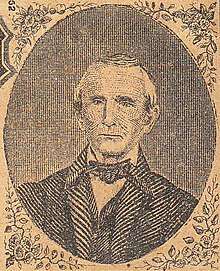
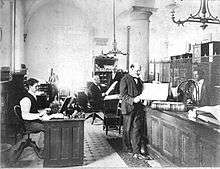
The Treasurers for the whole state are listed below:[3][4]
- Memucan Hunt, 1784–1787
- John Haywood, 1787–1827
- William S. Robards, 1827–1830
- William S. Mhoon, 1831–1835
- Samuel F. Patterson, 1835–1837
- Daniel W. Courts, 1837–1839
- Charles L. Hinton, 1839–1843
- John Hill Wheeler, 1843–1845
- Charles L. Hinton, 1845–1851
- Daniel William Courts, 1851–1863 (Democrat)
- Jonathan Worth, 1863–1865
- William Sloan, 1865–1866
- Kemp P. Battle, 1866–1868
- David A. Jenkins, 1868–1876 (Republican)
- John M. Worth, 1876–1885 (Democratic)
- Donald W. Bain, 1885–1892 (Democratic)[5]
- Samuel McDowell Tate, 1892–1895 (Democratic)[6]
- William H. Worth, 1895–1901 (Populist)[7]
- Benjamin R. Lacy, 1901–1929 (Democratic)
- Nathan O'Berry, 1929–1932 (Democratic)[8]
- John P. Stedman, 1932
- Charles M. Johnson, 1933–1949 (Democratic)
- Brandon P. Hodges, 1949–1953 (Democratic)
- Edwin M. Gill, 1953–1977 (Democratic)
- Harlan E. Boyles, 1977–2001 (Democratic)
- Richard H. Moore, 2001–2009 (Democratic)
- Janet Cowell, 2009–2017 (Democratic)
- Dale Folwell, 2017–present (Republican)
References
- Grandfather of State Treasurer John Haywood, as noted in Notable Southern families, Volume 2
- Connor, R.D.D. (1913). "North Carolina Manual".
- Connor, R.D.D. (1913). A Manual of North Carolina (PDF). Raleigh: North Carolina Historical Commission. p. 441. Retrieved April 27, 2019.
- Wheeler, John H. (1874). "The Legislative Manual and Political Register of the State of North Carolina". p. 441. Retrieved April 9, 2019.
- NCpedia: Bain, Donald William
- NCpedia: Tate, Samuel McDowell
- William H. Worth Papers
- Political Graveyard
